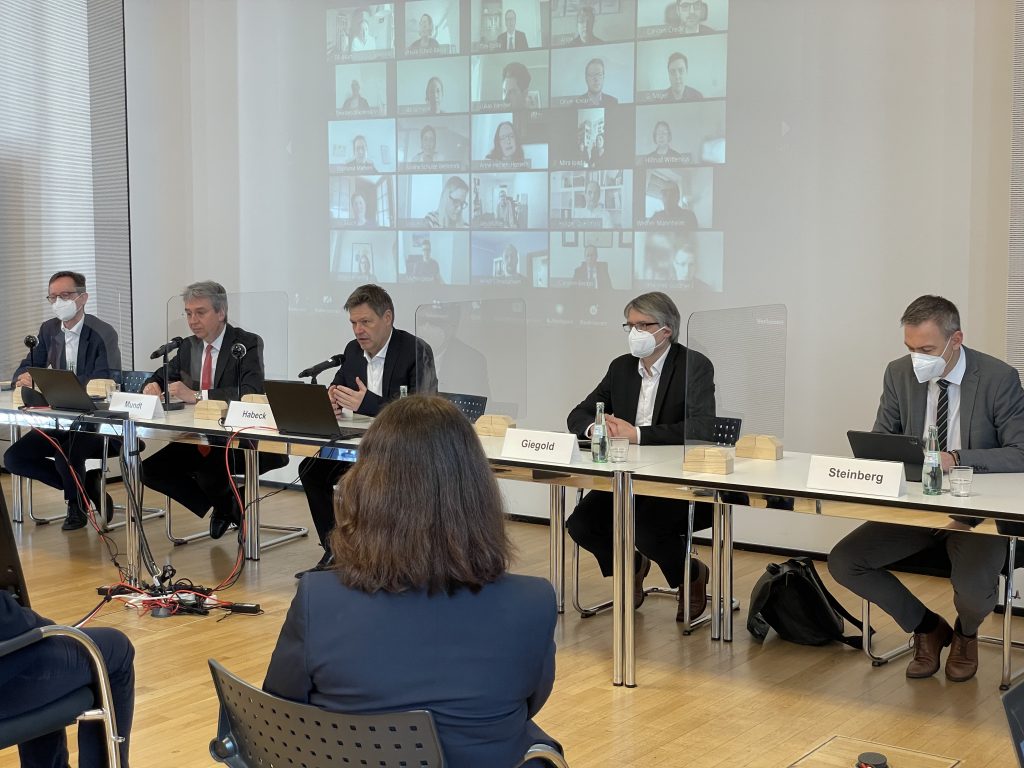
Competition policy agenda of the BMWK until 2025
High-ranking visitor in Bonn: The new German Federal Minister for Economic Affairs and Climate Protection Robert Habeck made his “inaugural visit” to the Federal Cartel Office in Bonn today, Monday, February 21, 2022. Habeck is the first Green minister to hold this office. He was accompanied by State Secretary Sven Giegold and Head of Department Philipp Steinberg – Giegold, a high-profile thinker of the Green Party, moved to Berlin from the European Parliament, and had previously dealt with competition policy. Steinberg was already head of the economic policy department in the ministry during the last legislative period. Habeck had a gift for Andreas Mundt and the German community: he presented a 10-points plan with the BMWK’s competition policy agenda until 2025. BMWK, by the way, stands for the new house name: Federal Ministry of Economics and Climate Protection, in German: Bundesministerium für Wirtschaft und Klimaschutz. The ambitious competition policy agenda also has an ecological footprint. The full text is available to us and is documented by D’Kart here. The translation is an inofficial translation by us, not by the Ministry – so reservations may be made regarding the wording. Habeck spoke with the staff of the Bundeskartellamt, an authority that formally belongs to his Ministry, but is independent on substance. in a hybrid conference, Giegold also met other members of the Federal Cartel Office for individual talks, according to the press release.
10 points for sustainable competition as a cornerstone of the social-ecological market economy, Berlin 21.02.2022
We want to put regulatory policy back at the center of economic policy interest after decades of loss of importance. The current challenges – above all digitization, fair globalization and sustainability – can only be solved with international coordination and an up-to-date regulatory framework. Where there is no appropriate regulatory framework, markets fail with significant consequences for the economy, society and the environment. Regulatory policy is therefore an indispensable component of successful economic policy. That is why we take regulatory policy seriously and rely on a proactive competition law framework enforced by strong and independent antitrust authorities. This is a central component of an ecological-social market economy. To this end, we will further strengthen the Federal Cartel Office and its legal capabilities and maintain a regular high-level dialog with it.
1. Take regulatory policy seriously
Regulatory policy essentially means two things: first, orienting markets to the long-term common good by means of a clear, reliable framework; and second, giving space to private investment, market forces and competition within this regulatory framework. Competition is one of the central pillars of the regulatory framework in order to systematically counteract the emergence of harmful concentrations of market power and their abuse. In other areas, regulatory policy was for some time erroneously equated with reliance on unregulated market forces – for example, it was the financial market crisis that first catalyzed the reorganization of financial markets. Macroeconomic stability, social balance and the strengthening of innovation also need an active economic policy.
Regulatory policy also means reducing unnecessary privileges and subsidies in favor of assertive special interests. Subsidies have their value where the market does not produce technical innovation or does not reward it and it needs to be stimulated. However, policymakers must effectively counter the risk of over-subsidization and mutually contradictory effects of different economic policy instruments. Permanent subsidies must be avoided, as must unnecessarily high costs for the public purse.

2. Place contemporary regulatory and competition policy at the center of economic policy
Not least the regulation of big tech has brought competition policy closer to the center of the economic policy debate again. It is the task of policymakers to set the guidelines for competition policy and to bring competition rules up to date in each case. Above all, the dual transformation of the economy – sustainable and digital – is a major social task that requires a democratic and open debate, even beyond the experts. In this legislative term, the BMWK will evaluate the Act against Restraints of Competition (GWB) and make proposals for its further development. This is to be a participatory process. The focus will be on the particular concerns of small and medium-sized enterprises and consumers as well as the aspects of innovation, sustainability and social justice. To ensure that the legal conditions are not only enforced by state authorities, we also want to strengthen private enforcement, particularly in the digital area. An important element will also be the reform of the ministerial authorization procedure (Ministererlaubnis) so that, in particular, there are once again appropriate opportunities to take legal action against a ministerial authorization and the German Bundestag is also involved in the procedure.
3. Support transformation
The double transformation of the economy requires contemporary regulatory policies. The climate crisis is the biggest market failure of all. Climate protection as the central challenge of our generation therefore requires the most far-reaching internalization of external effects to date, for example through a CO2 pricing mechanism that is as comprehensive as possible, without allowing the competitiveness of the German and European economy to be affected by carbon leakage. At the same time, economic policy must sometimes move away from a pure market failure logic in order to achieve important and pressing political goals. This applies not only to Europe’s competitiveness in the area of digitalization – the digital transformation – but also to the green transformation. Successfully tackling the climate crisis in increasingly scarce time and mastering the transformation of our economy also requires a modern, efficient and investing state and the mobilization of all private and public forces in the common interest. This transformation is the “moon landing mission” of our generation. In doing so, we use market- and competition-compatible instruments – such as climate contracts (carbon contracts for difference) – to promote innovation and its diffusion. Taking regulatory policy seriously therefore means going beyond the successful rules of competition to supplement the regulatory framework of a social-ecological market economy with rule-based and effective instruments. In doing so, social balance must always be taken into account.

4. Strengthen the framework for a competitive and social energy transition
Functioning competition is a prerequisite for an economic and socially acceptable energy transition and benefits consumers. Competition policy can help curb the rise in the price level for energy in the short and medium term. The antitrust authorities are closely monitoring developments in the energy sector and are swiftly putting an end to anti-competitive behavior. We will extend the necessary antitrust framework of stricter abuse supervision of electricity and gas prices (Section 29 GWB) and extend it to the district heating sector. In view of the sharp rise in energy prices, the Federal Cartel Office and the Monopolies Commission are currently investigating the extent to which abusive behavior might play a role alongside global market developments. We must distribute the burden of rising energy costs fairly among consumers and companies with energy, tax and social policy measures.
5. Increase legal certainty for sustainability in antitrust law
The primary task of antitrust law is to protect competition, which also contributes to sustainable economic activity. Cartels can, for example, prevent competition for innovation and better standards. Oligopolies can restrict fair competition with fair prices, especially in the food market. For this reason, antitrust abuse supervision by the BKartA is to be strengthened, particularly in the food trade, and further action is to be taken against unfair trade practices.
Functioning markets produce innovative solutions – including numerous sustainability innovations. Where companies want to jointly achieve sustainability goals or human rights standards beyond government requirements, competition policy must provide legal certainty as to how this can be done in compliance with antitrust law. The BMWK is therefore examining whether and how the competition framework can be adapted. The aim is to provide companies with a clear legal framework for sustainability cooperation without facilitating “greenwashing” of cartels or other forms of disguised restrictions on competition.

6. Improve public enforcement of consumer protection
Since the 9th amendment to the GWB, the Federal Cartel Office has had the authority to conduct sector inquiries under consumer law, but it lacks the official powers to remedy any infringements of the law. The Bundeskartellamt’s consumer law sector inquiries have revealed protection gaps in consumer law and, in some cases, unsatisfactory law enforcement. Above all, structural deficits in law enforcement must be corrected so that competition can better serve the interests of consumers and be structured fairly. The coalition agreement therefore calls for the Federal Cartel Office to be strengthened so that it can investigate and put an end to significant, persistent and repeated infringements of commercial consumer law. The BMWK will also develop proposals for this.
7. Strengthen public procurement as a driver for the transformation to a social-ecological market economy
Modern public procurement law is the key to fair and responsible competition for public contracts. The competition register launched at the Federal Cartel Office in December 2021 marks an important milestone on this path by providing contracting authorities with reliable information on economic offenses by companies. In this way, the public sector strengthens fair competition by providing additional incentives for compliance. With its significant buying power, public procurement can also provide important impetus for the socio-ecological and digital transformation. It helps to establish innovative and sustainable services in the market as well as create a level playing field for socially and environmentally responsible companies. The new requirements for climate-friendly procurement and the requirement to consider a CO2 shadow price lay the foundation on which ambitious public procurement can be built that is comprehensively aligned with sustainability goals. To this end, we will strengthen the binding nature and make even better use of the advantages of digitization. In addition, new regulations to tie public procurement to compliance with representative collective agreements will help strengthen collective bargaining.
8. Strengthen the Federal Cartel Office in the enforcement of competition law
In all the above-mentioned tasks at the national level, the Bundeskartellamt has the decisive role of enforcing the regulatory framework under competition law on the regulatory side. Digital markets in particular are complex, and business models and technologies are constantly changing. Market abuse and distortions of competition can take place in a variety of ways. There can be no such thing as an advantage in competition through breaking the law. In order to meet the new challenges, the BMWK is committed to strengthening the Bundeskartellamt in antitrust enforcement and in the area of merger control – both in terms of staff and IT infrastructure. The Bundeskartellamt should continue to be able to take action against abusive behavior by companies with overriding cross-market importance for competition (Section 19a GWB) even after the EU Digital Markets Act (DMA) comes into force.
9. Strengthen EU competition policy and make it more transparent
Competition policy can only succeed – in the face of the aforementioned challenges and beyond – on a European level. The BMWK will continue to provide impetus at the European level and actively contribute constructive and ambitious proposals for European competition policy. For example, the GWB Digitization Act, which came into force at the beginning of 2021, has gained worldwide recognition, particularly with its new rules for large digital companies. The European Commission has followed up with its proposal for the (DMA). The BMWK is committed to a high level of ambition in the negotiations. This includes, for example, ensuring interoperability for basic functions of messenger services and social networks so that consumers have more choice and smaller competitors are strengthened. Higher interoperability and improved portability of data strengthens new competitors. Open access to data while maintaining strong data protection enables innovative new entrants. Large digital platforms must treat all users and providers fairly and must neither abuse their position nor use it to engage in virtual highway robbery. In addition, the BMWK advocates strict control of companies with strong market positions in the event that potential competitors are bought out. All regulations of the DMA must be effectively enforced. The national competition authorities should support the Commission in this. Close coordination is also needed at international level to create modern competition rules for digital markets. To this end, Germany will expand the G7 dialog as part of its presidency.
Beyond the DMA and merger control, we want to strengthen cartel prosecution through an initiative to better protect leniency witnesses and reform the EU Cartel Damages Directive. In the long term, we advocate an abuse-independent unbundling option at European level as a last resort in entrenched markets. The BMWK will work to make legislative procedures on competition law at the EU level more transparent and participatory and to improve the institutional balance between the EU Commission, the Council and the European Parliament. Public debates are in line with the sociopolitical importance of competition policy. The BMWK also supports the ongoing revision of the vertical and horizontal block exemption regulations together with the respective guidelines, the procedural aspects of EU merger control and the notice on market definition.
10. Strengthen fair competition globally
Fair competition also includes effective action against distortions of competition stemming from global competition between different economic systems. We thrive on openness to trade and investment and have no interest in compartmentalization. But we must not be naive in this. Where competition does not take place with common rules, we must use the strength of the European single market and European competition law and do our utmost to create a level playing field and confidently defend our interests in the global context. First and foremost, European trade policy is called upon here to find solutions to distortions of competition in a multilateral framework and through negotiations. At the same time, it is right for the EU to sharpen, develop and use its toolbox in dealing with unfair distortions of competition and unfair practices by other countries. Where unfair practices, subsidies and systematic market interventions by third countries distort competition in the EU’s internal market, we need effective remedies to ensure fair competition in our own markets. The BMWK therefore supports the negotiations on a new regulation on subsidies from third countries that distort the internal market.
D’Kart documents the BMWK’s Competition Policy Agenda to 2025 with the kind permission of the German Federal Ministry of Economics and Climate Protection. This translation, however, is an unofficial one by the team of D’Kart.